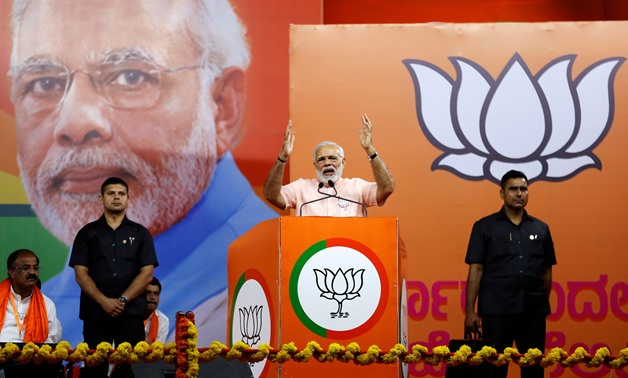
FILE PHOTO: India's Prime Minister Narendra Modi addresses an election campaign rally ahead of the Karnataka state assembly elections in Bengaluru, India, May 8, 2018. REUTERS/Abhishek N. Chinnappa
NEW DELHI/SRINAGAR - 15 February 2019: India's Prime Minister Narendra Modi warned Pakistan on Friday to expect a strong response to a bomb attack in the disputed region of Kashmir that killed 44 paramilitary policemen, ratcheting up tension between the nuclear-armed neighbours.
The car bomb attack on a security convoy on Thursday was the worst in decades of insurgency in Jammu and Kashmir, India's only Muslim majority state.
"We will give a befitting reply, our neighbour will not be allowed to de-stabilise us," Modi said in a speech, after meeting security advisers to discuss options.
The attack comes months before an Indian general election.
The Pakistan-based Islamist militant group Jaish-e-Mohammad (JeM) claimed responsibility soon after a suicide bomber rammed a explosives-laden car into a bus carrying police personnel.
India has for years accused Muslim Pakistan of backing separatist militants in divided Kashmir, which the neighbours both claim in full but rule in part.
Pakistan denies that, saying it only offers political support to the Himalayan region's suppressed Muslim people.
The White House urged Pakistan in a statement "to end immediately the support and safe haven provided to all terrorist groups operating on its soil".
India said it had "incontrovertible evidence" of Pakistani involvement in the attack. The Pakistan government responded with a stiff denial, calling the attack a matter of "grave concern."
As outrage and demands for revenge flooded Indian social media, Arun Jaitley, one of the most senior figures in the Hindu nationalist-led government, told reporters India would work to ensure the "complete isolation" of Pakistan.
The first step, he said, would include removing most favoured nation (MFN) trade privileges that had been accorded to Pakistan - though annual bilateral trade between the countries is barely $2 billion.
The last major attack in Kashmir was in 2016 when Jaish militants raided an Indian army camp, killing 20 soldiers. Weeks later, Modi ordered a surgical strike on suspected militant camps across the border in Pakistan Kashmir.
When he swept to power in 2014, Modi vowed to pursue a tough line with mostly Pakistan. The two countries have gone to war three times since independence from Britain in 1947, twice over Kashmir.
The Line of Control, the de facto border dividing Indian- and Pakistani-held Kashmir, is widely regarded as one of the world's most dangerous flashpoints, especially after the two countries became nuclear armed states in 1998.
CALLS FOR REVENGE
Indian Foreign Secretary Vijay Gokhale summoned Pakistan's ambassador, Sohail Mahmood, and issued a demarche demanding Pakistan take verifiable action against the Jaish.
Crowds gathered in Jammu, the Hindu-dominated part of Jammu and Kashmir state, demanding stronger action against Pakistan.
A curfew was briefly imposed in Jammu after crowds overturned and set fire to some vehicles. Protesters were also marching to the Pakistani embassy in New Delhi.
The attack comes at a difficult time for Pakistan, which is struggling to attract foreign investment and avert a payments crisis, with its swiftly diminishing foreign currency reserves at less than $8 billion, equivalent to two months of import payments.
The escalating tension risks overshadowing a visit to the region by the Saudi crown prince, who is due in Islamabad over the weekend and New Delhi next week, with both governments hoping to attract Saudi investment.
India's Home Minister Rajnath Singh flew into Srinagar, the main city in Indian Kashmir, and joined mourners carrying the coffins of the dead policemen, before they were sent to their homes across India.
Hundreds of thousands of Indian troops are deployed in Kashmir.
The separatist insurgency has waxed and waned since the late 1980s, but began to pick up in the last five years as a fresh generation of Kashmiris was drawn to militancy.
Soon after Thursday's attack, Jaish released photographs and a video of a young Kashmiri villager, Adil Ahmad Dar, who it said had carried out the suicide attack on the convoy.
In the video, Dar warned of more attacks to avenge human rights violations in Kashmir. On Friday, hundreds of people gathered at his village of Lethipora to mourn his death.
Jaish is one of the most deadly groups operating in Kashmir.
In 2001, it mounted an attack on the parliament in New Delhi that brought India and Pakistan to the brink of war.
Indian efforts to add Jaish leader Masood Azhar to a U.N. Security Council blacklist of al Qaeda-linked terrorists have been blocked by China.
Chinese foreign ministry spokesman Geng Shuang expressed “deep shock” at the latest attack.
China resolutely opposed and strongly condemned all terrorism and hoped “relevant countries in the region” could cooperate to combat the threat, he told reporters.


Comments
Leave a Comment